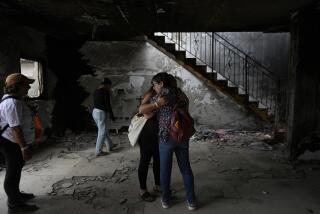U.N. Marks Its Iraq Deaths
- Share via
UNITED NATIONS — A year after the suicide bombing of the U.N.’s Baghdad headquarters killed 22 people, U.N. staffers around the world paid tribute to their fallen colleagues Thursday, but complained that the world organization had yet to adequately protect its workers in dangerous areas.
In solemn ceremonies in New York, Geneva, Baghdad and Amman, Jordan, U.N. staffers and relatives of those slain lighted candles and shared a simultaneous silence to remember the moment that the U.N. realized it had become a target -- and to vow it wouldn’t happen again.
“We are no strangers to violence and intimidation,” Secretary-General Kofi Annan told the audience in Geneva. The attack was a “unique blow” that had traumatized the organization and himself, he said in an unusual personal aside.
“You can imagine my agony, discouragement and deep sense of loss -- not only as a friend, but also as the individual who is ultimately responsible for the welfare and security of United Nations staff,” he said. The events “touched me to the core.”
The U.N. had been absent from Iraq since withdrawing its international staff after a second fatal attack last autumn. A small group of permanent employees returned to Baghdad only last week.
Senior officials agree that the bombing changed them, and especially their attitude about how deeply the organization should become involved in Iraq. The issue has been politically precarious -- the U.N. didn’t want to be seen as supporting the war by staying in the country, or as abandoning Iraqis by staying out. But the growing security threat has added another dimension of difficulty.
“There is a whole new psychology of concern,” said Danilo Turk, assistant secretary-general for political affairs. The U.N. agreed to take a “leading role” in rebuilding Iraq on the optimistic assumption that the situation would improve, he said. But security has continued to deteriorate and the degree of the world body’s engagement is still a matter of debate. “It is a different U.N. now,” Turk said.
Washington has viewed the U.N.’s withdrawal from Iraq with disappointment. And U.S. officials said they hoped the U.N.’s cautious return would induce other countries to offer troops and persuade international aid groups to come back. U.N. political experts helped organize this week’s Iraqi national conference and will assist preparations for elections due by the end of January. They will also help draft a constitution and offer humanitarian support.
But U.N. staffers said that Iraq was still too risky and that the organization hadn’t made enough changes in its security system to protect them, not only in Iraq but in other dangerous missions such as Afghanistan.
After the morning candle-lighting ceremony, hundreds of employees marched in a silent circle around a fountain in front of U.N. headquarters in New York, as they did a year ago. Some carried signs saying, “No Security, No Deployment” and “Release All Reports and Findings Now.”
Annan commissioned two security reports after the bombings, one of which concluded that the U.N.’s “dysfunctional” security system led to greater casualties in Iraq. But he hasn’t released the findings of the follow-up report that led to the forced resignation of the world body’s top security official, Tun Myat, and the transfer of another official.
The U.N. Staff Council, a union, said Annan had failed to keep his promise to do his “utmost” to ensure that security failures were not repeated in Iraq or in other risky missions. An additional 17 U.N. peacekeepers and civilian staffers have died in attacks since the Baghdad bombing.
“The best way to honor these people is to make sure these failures don’t happen again,” said Guy Candusso, a vice president of the staff union. “We can’t guarantee that nobody will be killed, but we have to do our utmost to prevent these tragedies. They haven’t done so.” The Staff Council called on Annan to appoint a security coordinator, a post that has been unfilled since November, to implement security management reforms and to explain to the staff what has been done -- instead of withholding assessments.
“Filling the security post is a high priority,” said Catherine Bertini, the management chief who has been charged with security oversight until the job is permanently filled. “We’re looking carefully for the right person.”
Bertini said that security training was now mandatory for all staffers going overseas and that the U.N. had beefed up standards and precautions at its facilities worldwide.
More to Read
Sign up for Essential California
The most important California stories and recommendations in your inbox every morning.
You may occasionally receive promotional content from the Los Angeles Times.













